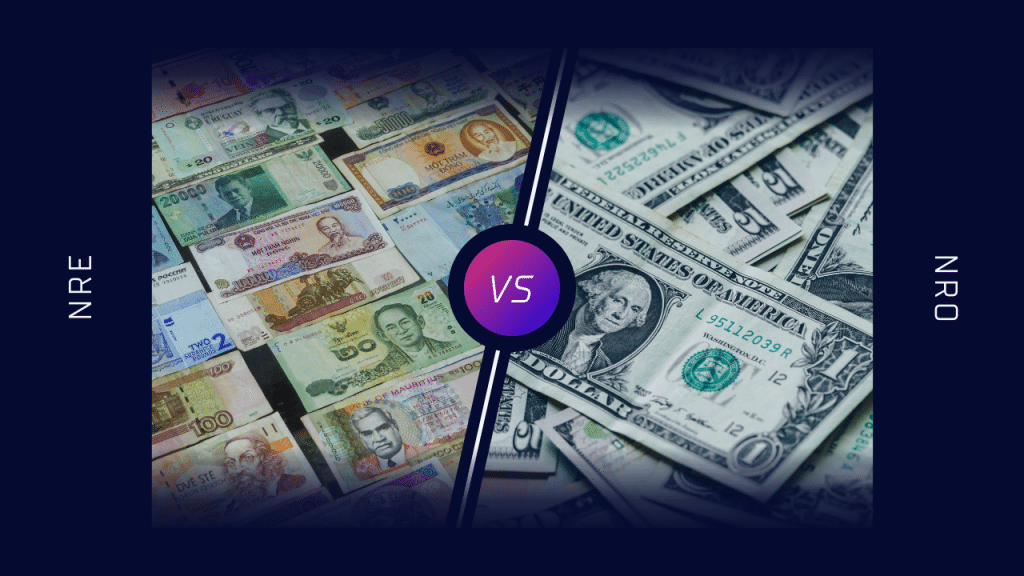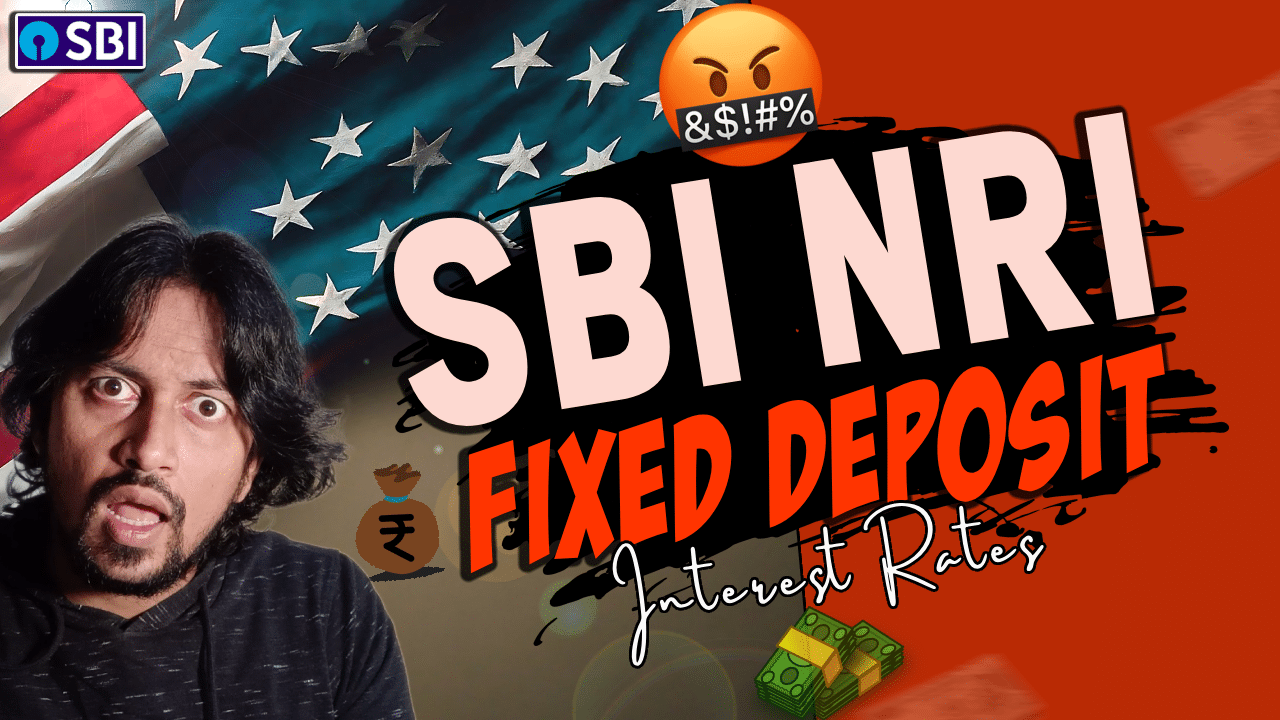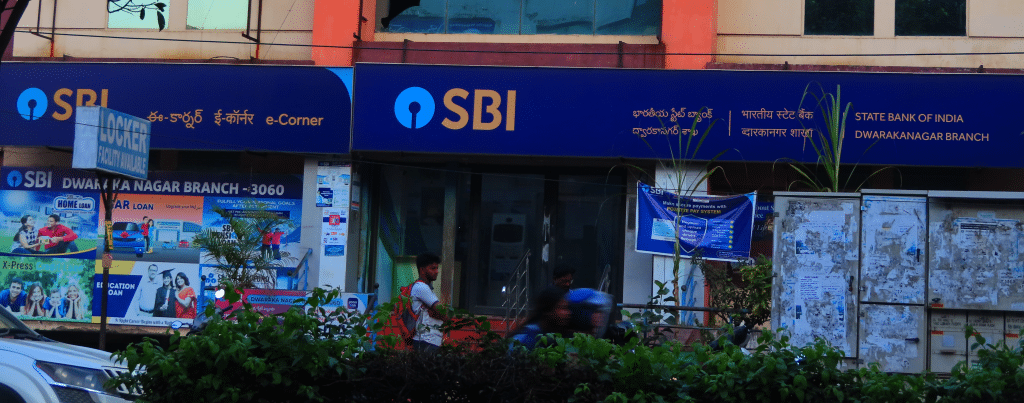SBI NRI FD Interest Rates
Introduction
India’s largest Public Sector Bank, State Bank of India (SBI) announced its latest Fixed Deposit Interest rates on retail deposits of up to Rs.2 Crores and also on Bulk deposits of more than Rs.2 Crores for Indian citizens and NRI.
As per the SBI website, the new Fixed Deposit interest rates are effective from May 15, 2024.
In this article, We delve into how much interest is offered for the Indians working outside the country through NRE and NRO accounts.
Let’s get started..!!
What is the Difference between NRE and NRO

“NRE” stands for Non-Resident (External) Account and
“NRO” stands for Non-Resident (Ordinary) Account.
Under both these accounts, the Non-Resident Indians (NRI) depositors can open deposit money with Indian banks to manage their income.
NRE accounts offer Tax-free benefits and interest earned on NRE accounts is not taxable in India.
In contrast, the NRO accounts are taxable at @30% as per the provisions of the Income Tax Act, of 1961.
| S.No. | Differences | NRE | NRO |
|---|---|---|---|
| 1. | Meaning | “NRE” means Non-Resident External Account | “NRO” means Non-Resident Ordinary Account. |
| 2. | Purpose | NRIs can transfer Foreign earnings to India | It’s an NRI account to manage incomes earned in India. |
| 3. | Deposit & Withdrawls | Deposits can be made in Foreign currency, while withdrawals can be made in Indian currency. | Deposits can be made in Foreign and Indian currency, while withdrawals can be made in Indian currency. |
| 4. | Tax benefits | Tax-free | Taxable at @30% |
Types of SBI NRI Deposits
The State Bank of India (SBI) offers various term deposit options for Non-Resident Indian (NRI) accounts which are mentioned below.
| S.No. | Account Type |
|---|---|
| 1. | Non-Resident External Account [NRE] |
| 2. | Non-Resident Ordinary Account [NRO] |
| 3. | Foreign Currency Non-Resident accounts [FCNR] |
Let’s discuss 3 NRI deposits in detail and find the latest interest rates offered by these deposits.
1. Non-Resident External Account [NRE]
Coming to NRE accounts, the State Bank of India (SBI) offers a term deposit option that allows NRIs to deposit their foreign earnings in Indian Banks by converting them into Indian currency.
For Example,
Converting US Dollars and pounds into Indian Rupees
The earned interest portion on these NRE accounts will be credited to the depositor’s Savings bank account and the Interest will be paid every Quarter.
If the State Bank of India NRI customer is looking for Compound interest on your term deposits, then, you should look at SBI Special Term deposits which offer interest on a Quarterly compounding basis and will be paid at a Maturity along with the Principal amount.
How much interest can be earned through NRE account?
Keep on Reading my dear friend..!!
SBI NRE FD rates

For the NRI depositors of SBI, w.e.f May 15th, 2024 the SBI NRI FD Interest Rates for NRE accounts are as follows
| Tenure | Below Rs.2 Crore | Rs.2 Crore & Above |
|---|---|---|
| 1 year to less than 2 years | 6.80% | 7.00% |
| 400 Days (AMRIT KALASH) | 7.10% | – |
| 2 years to less than 3 years | 7.00% | 7.00% |
| 3 years to less than 5 years | 6.75% | 6.25% |
| 5 years to 10 years | 6.50% | 6.00% |
From the above table, it is clear that you will get more interest if you deposit money in SBI Amrit Kalash, a Special Fixed deposit scheme with a period of 400 days.
I have a money requirement, Can an NRE FD be broken before maturity??
Yes. A State Bank of India NRI customer can prematurely withdraw their deposits subject to the below conditions.
Zero Interest
For Below Rs.2 Crore deposits, the SBI customer will get no interest if they have withdrawn below in less than one year.
Not only that, W.e.f. Apr 1st, 2017, the NRE depositors should pay a penalty for Premature withdrawal as mentioned below.
| For Deposits | Penalty (All Tenors) |
|---|---|
| Up to Rs.5.00 lacs | 0.50% |
| Above Rs.5.00 lacs but below Rs.1 Crore | 1.00% |
NRE Non-Callable Term Deposit Interest Rates:
A non-callable Term Deposit is a type of deposit that cannot be withdrawn before its maturity date except under special conditions.
If you are planning to invest your money into an NRE Non-Callable Term Deposit, the interest rates w.e.f May 15th, 2024 are as follows.
| Tenure | For Deposits | Rate of Interest (p.a.) | Rate of Interest (p.a.) |
|---|---|---|---|
| 1 Year | Deposit of Rs.1.0001Crore (Rs. One Crore and one Thousand) to less than 2.00 Crores (p.a.) | 7.10% | 7.40% |
| 2 Years | Deposit of Rs.2.00 Crores and above Interest Rate (p.a.) | 7.30% | 7.40% |
It is to be noted that non-callable Term Deposit offers higher interest as compared to regular NRE term deposits.
2. Non-Resident Ordinary Account [NRO]
Coming to the second deposit of a Non-Resident Ordinary Account.
It offers NRIs a convenient way to manage their Indian income (i.e. Indian rupees) through this account. These NRO accounts hold
– Pensions,
– Rental Incomes, and
– Dividends and also receive funds both in Indian rupees and in Foreign currencies.
Here is an example,
Holding US Dollars in Dollar only and
Pounds into Pounds &
Indian rupees into Indian Rupees only.
What is the interest rate in the NRO account SBI?
Keep on reading…!!
SBI NRO FD rates for less than Rs. 2 Crores

The interest rates applicable for SBI NRO FD rates for NRI deposits of Below Rs.2 Crore rupees w.e.f May 15th, 2024 are as follows
| Tenure | Below Rs.2 Crore |
|---|---|
| 7 days to 45 days | 3.50% |
| 46 days to 179 dayS | 5.50% |
| 180 days to 210 days | 6.00% |
| 211 days to less than 1 year | 6.25% |
| 1 year to less than 2 years | 6.80% |
| 400 Days (AMRIT KALASH | 7.10% |
| 5 years and up to 10 years | 7.00% |
| 3 years to less than 5 years | 6.75% |
| 5 years and upto 10 years | 6.50% |
SBI NRO FD rates for Rs. 2 Crores & Above
The interest rates applicable for SBI NRO FD rates for NRI deposits w.e.f May 15th, 2024 for Rs.2 Crore & above are as follows
| Tenure | Rs.2 Crore & Above |
|---|---|
| 7 days to 45 days | 5.25% |
| 46 days to 179 dayS | 6.25% |
| 180 days to 210 days | 6.60% |
| 211 days to less than 1 year | 6.75% |
| 1 year to less than 2 years | 7.00% |
| 400 Days (AMRIT KALASH | – |
| 5 years and up to 10 years | 7.00% |
| 3 years to less than 5 years | 6.25% |
| 5 years and upto 10 years | 6.00% |
3. Foreign Currency Non-Resident accounts [FCNR]
Let’s see about FCNR.
FCNR stands for “Foreign Currency Non-Resident Accounts”.
– An FCNR account is a type of Savings account.
– This account plays a crucial role in managing the financial needs of NRIs.
FCNR accounts are bank accounts designed for NRIs to deposit and hold funds in Foreign currencies like US dollars, Euros, Pounds, and a lot more. These accounts will be maintained in Indian banks as per the regulations of the Reserve Bank of India (RBI).
SBI FCNR rates for USD
The interest rates applicable for SBI FCNR w.e.f May 15th, 2024 are as follows
| Tenure | USD | GBP | EURO | CAD | AUD | JPY |
|---|---|---|---|---|---|---|
| 1 year | 5.65% | 5.10% | 4.00% | 4.50% | 4.50% | 0.05% |
| Above 1 year to less than 2 years | 5.65% | 5.10% | 4.00% | 4.50% | 4.50% | 0.05% |
| 2 years to less than 3 years | 4.50% | 5.00% | 1.50% | 4.10% | 4.40% | 0.05% |
| 3 years to less than 4 years | 4.30% | 4.00% | 1.50% | 3.85% | 4.30% | 0.05% |
| 4 years to less than 5 years | 3.85% | 4.00% | 1.50% | 3.90% | 4.20% | 0.05% |
| 5 years | 3.90% | 3.90% | 1.50% | 3.95% | 4.10% | 0.05% |
Frequently Asked Questions on SBI NRI FD Interest Rates
1. What is an NRE account in Banking?
The term “NRE” stands for Non-Resident External Account. It is useful for the Non-residents of Indians (NRIs), who earn income in India. The NRE accounts offer Tax-free benefits and interest earned on NRE accounts is not taxable in India.
2. What is an NRO account in Banking?
“NRO” stands for Non-Resident Ordinary Account. It’s an NRI account to manage incomes earned in India.
3. What are the current interest rates offered by SBI on NRI Fixed Deposits?
The SBI NRI FD rates through the NRE account range from 6.50% -7.00% p.a. Whereas for the NRO accounts, it ranges from 3.50-7.10% p.a. for less than Rs. 2 Crore deposits.
4. How does SBI calculate interest on NRI FDs
State Bank of India (SBI) calculates Interest on NRI FDs on a Quarterly compounding basis. It means the interest on these deposits will be added to the Principal amount at the end of each quarter.
5. What is the highest interest rate on NRE FD?
If a State Bank of India NRI customer deposits money in NRE FD, then, to earn maximum interest, the customers should consider depositing money in NRE Non-Callable Term Deposit. It offers interest ranges from 7.10-7.40% p.a. for 1 year and 2 years.
6. What is the highest interest rate on NRO FD?
If a State Bank of India NRI customer deposits money in NRO FD, then, to earn maximum interest, the customers should hold the deposit for 400 days in a SBI Amrit Kalash. It is a Special Fixed Deposit scheme, that offers 7.10% interest p.a. and it is the highest among all.
7. SBI NRO FD rates for Senior citizens?
Senior NRI citizens who hold NRO accounts can earn interest ranges from 3.50%-7.10% p.a. for less than Rs. 2 Crore deposits.
8. Can I have a FD in my NRO account?
NRO Fixed Deposit (FD) account is one of the Investment accounts that allows NRIs to open an account in Indian currency or any convertible foreign currency. NRIs can open NRO FD account with their NRO Savings account only.
9. Is NRO FD tax free?
No. Non-Resident Ordinary Account (NRO) FDs are taxable at @30% as per the Income Tax Act, of 1961.
10. What is the Minimum period of NRO fixed deposit?
Non-Resident Ordinary Account (NRO) FDs can be held for a period between 7 days to 10 years. ICICI bank allows NRIs to deposit Rs.25,000 INR as a Low deposit amount.
11. What is the difference between NRE FD and NRO FD?
In the case of NRE, Deposits can be made in Foreign currency, while withdrawals can be made in Indian currency. Whereas, in the case of NRO, Deposits can be made in Foreign and Indian currency, while withdrawals can be made in Indian currency.
12. Is NRO better than NRE?
If you are choosing between NRO and NRE accounts based on your Income source, If you earn most of your money outside India and to freely transfer money to India without hassle to your home country, NRO is idle for them. However, if your income generates within the country, the NRO account would be a better fit for them.
13. Can a person hold both NRE and NRO account?
Yes. An NRI can open and maintain both a Non-Resident External Account and a Non-Resident Ordinary Account
Thanks for your time folks 🙂

